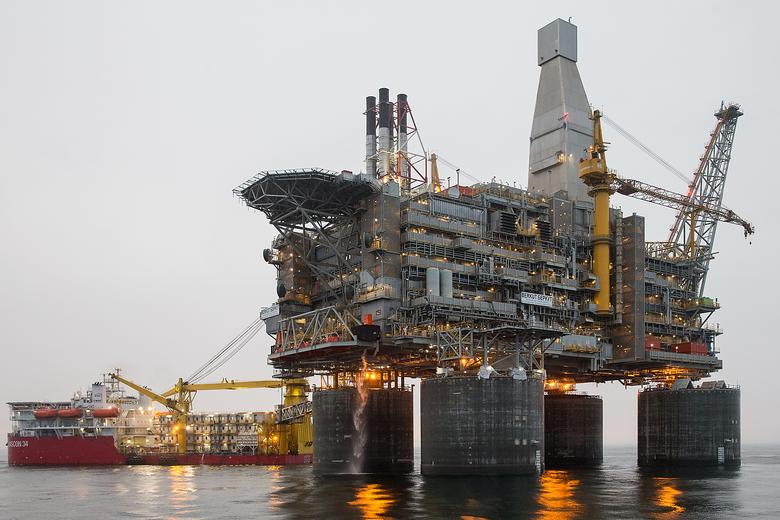
RUSSIA SANCTIONS: WON'T STOP DRILLING

When the White House, working with European allies, moved in early September to tighten sanctions against Russia, President Obama promised the damage to Russian interests would be severe. "These measures will increase Russia's political isolation as well as the economic costs to Russia, especially in areas of importance to President Putin and those close to him," Obama said in a statement on Sept. 11.
The rules gave U.S. companies engaged in Arctic, deepwater, or shale oil exploration and production in Russia 14 days to halt operations. One project was immediately affected: Universitetskaya-1, the $700 million joint exploration project that Rosneft, the Russian state-owned oil company, is developing in the Arctic with ExxonMobil (XOM).
The well, which the companies began drilling in August, is key to Russia's quest to find new oil fields to replace its declining Soviet-era wells. Universitetskaya-1 is supposed to tap an estimated 9 billion barrels of crude deep under the floor of the Kara Sea—at current market prices, a potential $894 billion bonanza.
What the sanctions didn't do was touch the many existing conventional oil-drilling operations run by Western companies in Russia. That includes Exxon's massive Sakhalin development off Russia's Pacific coast north of Japan, which has been pumping since 2005 and producing more than $500 million of crude every month. When oil is trading at $100 a barrel, Russia takes roughly 70 percent of that in production and mineral-extraction taxes, money that helps keep the country, and Putin's government, running.
By allowing international companies such as Exxon, Royal Dutch Shell (RDSA:LN), Halliburton (HAL), and Schlumberger (SLB) to carry on their pumping, the White House and its European allies assured stability in global oil markets and in the prices consumers pay for gasoline. The idea is "to impose economic pain on Moscow without cutting off current oil supplies to the global market," says Jason Bordoff, director of Columbia University's Center on Global Energy Policy and a former senior energy adviser to Obama. In doing so, they undercut their own goal of doing damage to Russia.
Since Russia's annexation of Crimea six months ago, the U.S. and European Union have steadily ratcheted up pressure on Putin's inner circle of politicians and billionaires as well as on banks and defense and energy companies close to the Kremlin, with little effect on Putin's Ukraine policy. A round of sanctions imposed in July was designed to crimp Rosneft's ability to acquire critical technology such as replacement drill bits from overseas suppliers, as well as capital. The September ban on U.S. companies providing advice and services to Rosneft goes a significant step further toward choking Russia's future growth. The country relies on U.S. and European technology and expertise to develop new fields, particularly in the Arctic and in shale formations, where U.S. and European geophysicists and rig workers have know-how that Russia doesn't.
Yet Russia's existing fields continue to pump 1 of every 8 barrels produced worldwide each day—an output valued at $425 billion a year, about one-fifth of the country's gross domestic product. Taxes on oil and gas production provide more than half of Russia's treasury revenue. U.S. and European companies have been instrumental in building the country's energy industry over the past 25 years, with the goal of capturing some of Russia's estimated 75 billion barrels of reserves.
Those companies are now deeply entwined with Rosneft. In 2012, British oil company BP (BP) agreed to acquire an almost 20 percent stake in Rosneft. Last year, Exxon sold a 30 percent interest in 20 of its deepwater exploration blocks in the Gulf of Mexico to Neftegaz America Shelf, an independent, indirect subsidiary of Rosneft.
Russia represents Exxon's biggest exploration prospect outside the U.S. The company owns drilling rights across 11.4 million acres of Russian land and seabed, an area twice the size of Massachusetts, and Exxon's chairman and chief executive officer, Rex Tillerson, hasn't been shy about his pursuit of new deals with Moscow. Even after the White House urged U.S. executives not to attend Putin's annual St. Petersburg International Economic Forum this spring, a senior Exxon development executive, Neil Duffin, went anyway, signing agreements and posing for photos with Rosneft CEO Igor Sechin, a close Putin confidant who's been barred from travel to the U.S. under sanctions adopted in April.
businessweek.com





